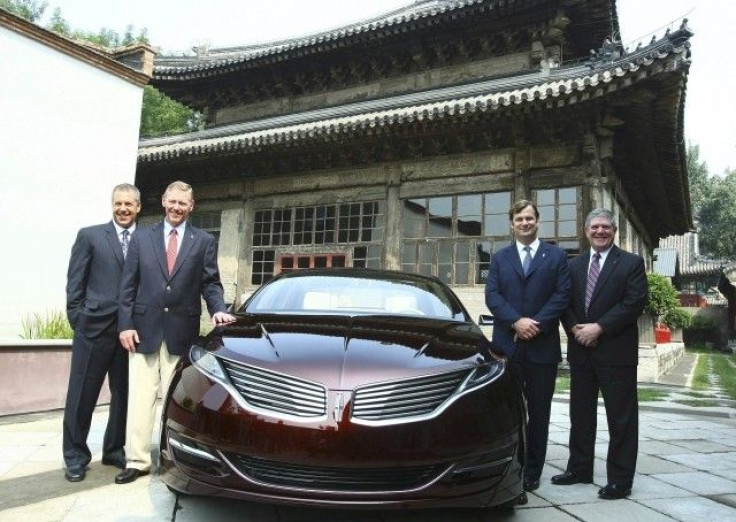Ford Brings Lincoln To China To Resist Cadillac's Onslaught

Ford Motor Company (NYSE: F) is hoping its Lincoln brand will be able to unlock the massive Chinese luxury car market, but the company is coming in late to a game already dominated by rival General Motors Company's (NYSE: GM) Cadillac brand and offerings from German luxury brands like Audi, Mercedes-Benz and BMW.
Ford will bring its struggling Lincoln brand to China, the company announced Tuesday, marking its largest expansion in 50 years. Ford's Lincoln brand has lagged far behind General Motors' luxury competitor Cadillac. In the U.S. in July, GM sold 13,417 Cadillac's an almost 21 percent improvement over the year before, while sales of Lincoln vehicles in the U.S. were a paltry 6,975 vehicles and actually fell 10.7 percent from the previous year. Moreover, while Ford has not had any kind of luxury unit in China previously, GM sold 30,000 Cadillacs there in 2011, an increase of almost 100 percent from 2010.
Despite starting from a major deficit in terms of brand recognition and sales, Ford hopes that Lincoln can take off in China and bolster its poor U.S. sales. Ford sales it will begin selling Lincoln's in China beginning in the second half of 2014 through an independent dealer network. Ford appointed Richard Baker, former president of Ford Group Philippines and managing director of PT Ford Motor Indonesia as general manager for Lincoln China.
"Lincoln is an important part of our plan, and introducing Lincoln in China marks the next step in our expansion in Asia and our commitment to serving customers in the luxury market," Ford president and CEO Alan Mulally said. Ford recognizes the "growth potential" for Lincoln in China, Mulally added.
The luxury car market in China is certainly growing at a breakneck pace, as demonstrated by Cadillac's skyrocketing sales and outside analysis. The luxury car market in China is expected to surpass the U.S. market by 2020, accounting for around 2.7 million vehicles per year, or 9 percent of the Chinese market, according to IHS. Ford also says that the Chinese luxury market is changing from one where individuals buy luxury cars as a means of displaying wealth to one where they buy cars because of personal preference, a change the company hopes to leverage with the Lincoln brand.
"Globally we're seeing a new generation of luxury clients who value more individualistic and tailored options. In China, the emerging luxury buyers are younger and fast-changing, and they have a strong desire to understand and appreciate the heritage of a brand," Ford group Vice President for global marketing sales and service Jim Farley said.
Ford says that Lincoln in China will "provide a personalized brand experience," but does not specify what that actually means beyond saying the brand will "distinguish itself by providing more individual and personalized motor cars, and a more personal and crafted experience to match," according to Farley. The company was not forthcoming on what and individual and personalized Lincoln experience means, but it may hint that they will try and beat Cadillac by creating some kind of boutique dealer and purchasing experience for Chinese consumers.
Beyond somewhat soft promises about personalizing the Lincoln brand for China, Ford has made a major manufacturing commitment. The company is currently building five factories in Chongqing, China which will boost capacity there to 1.2 million vehicles a year. Globally, Ford is aiming to expand sales to 8 million by 2015, a 50 percent increase from 2010 levels.
Ford Motor Company (NYSE: F) shares fell 3 cents to $9.36 Tuesday. General Motors Company (NYSE: GM) shares fell 17 cents to $21.05.
© Copyright IBTimes 2024. All rights reserved.











